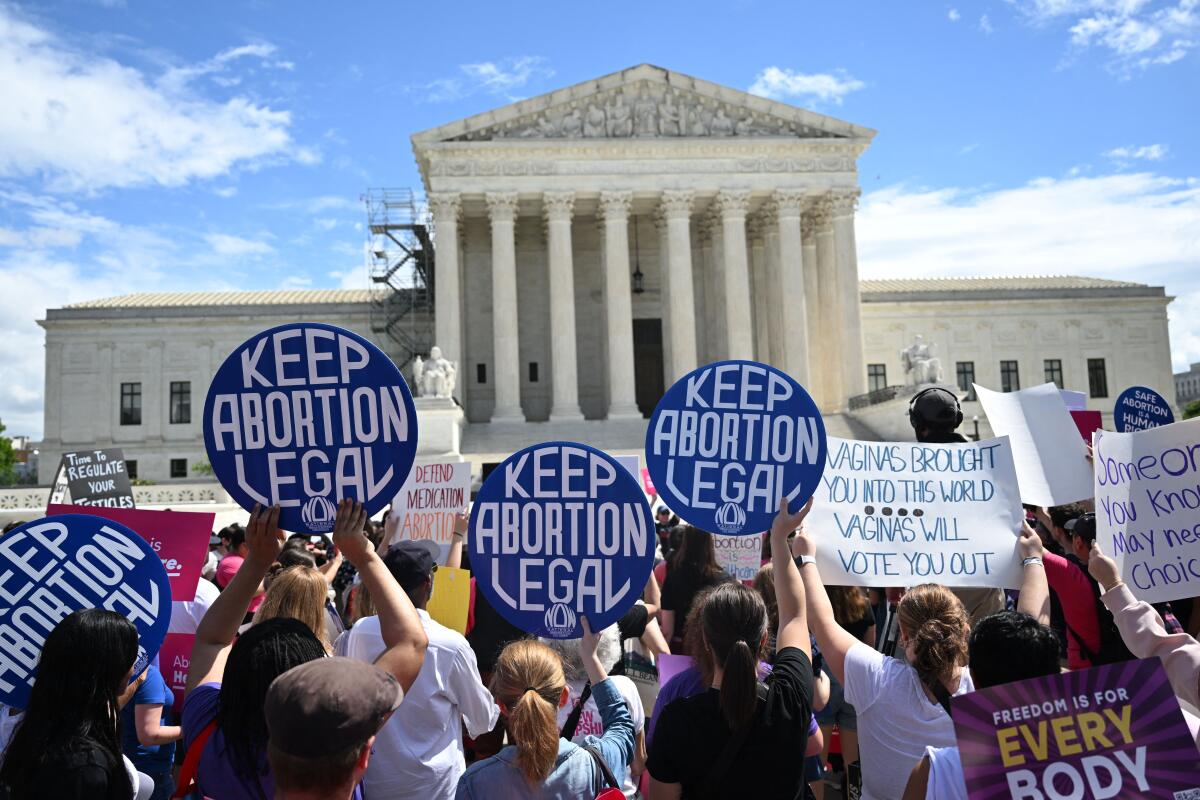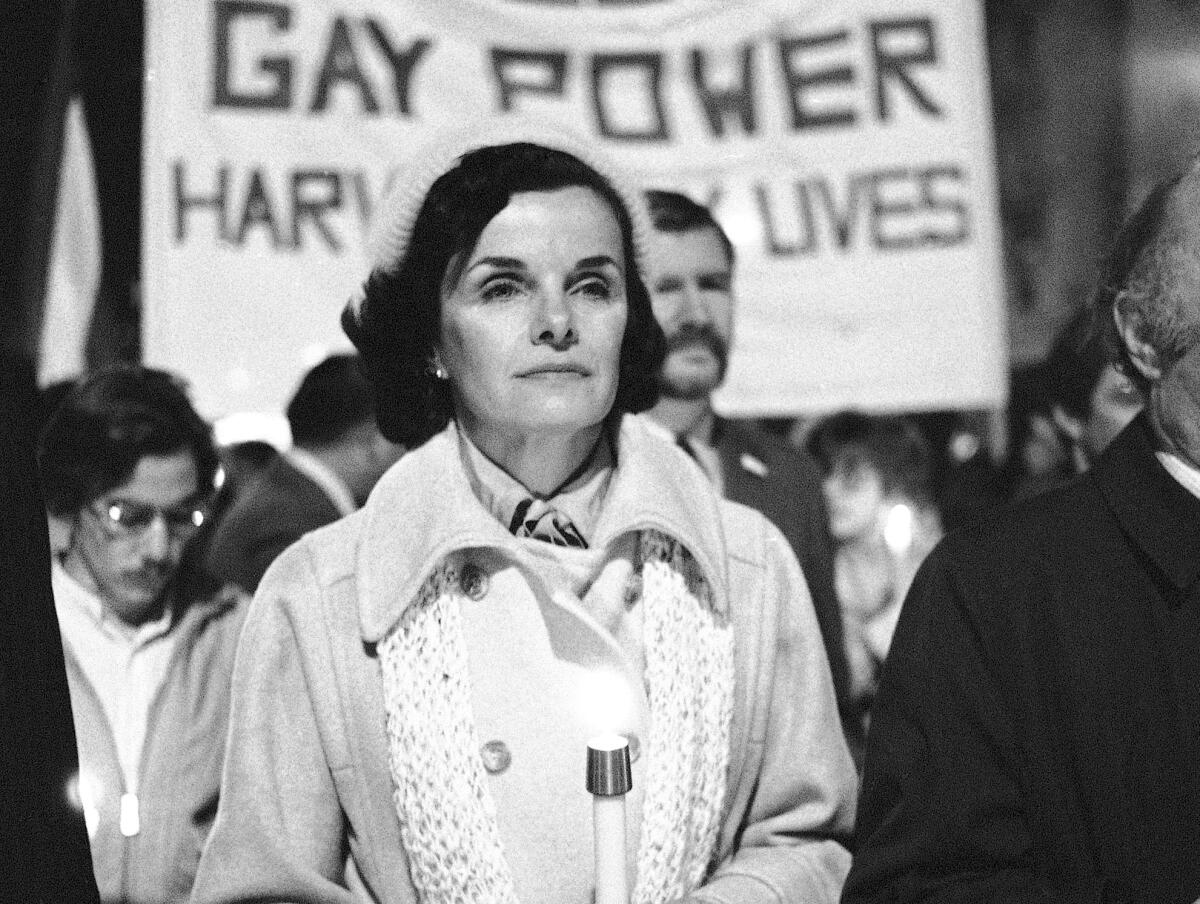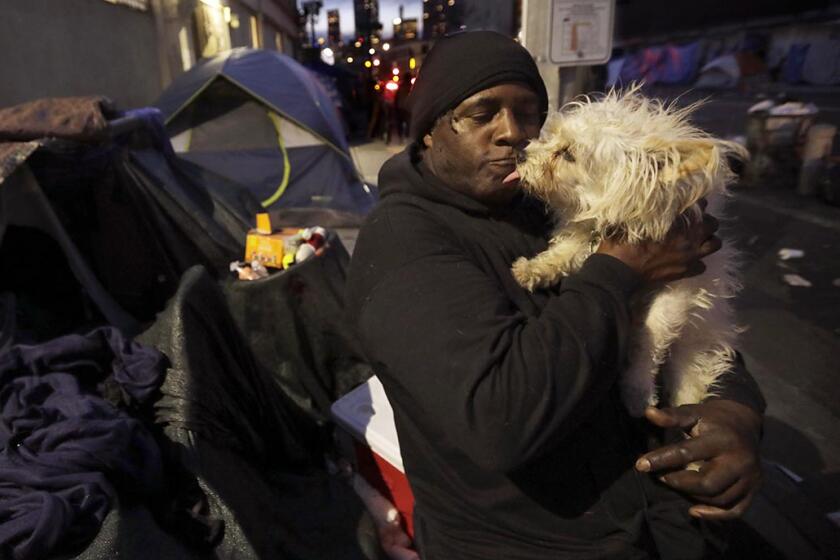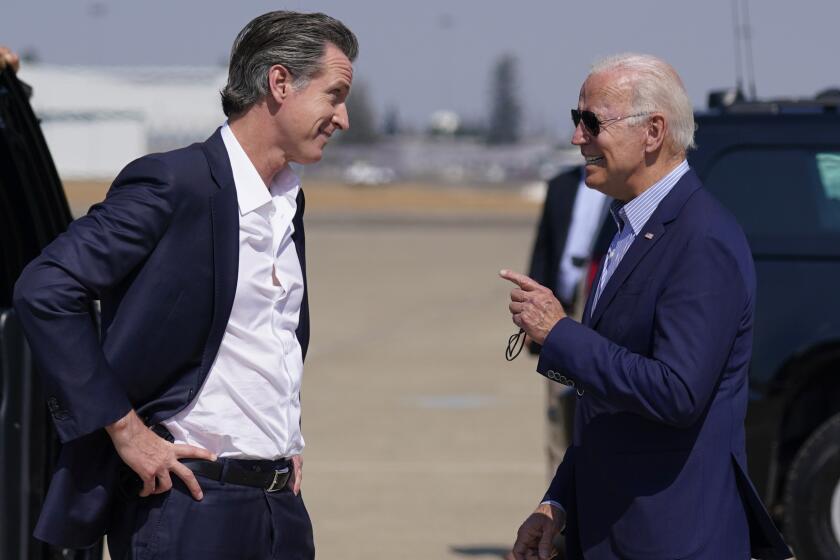Column: The year America burned, literally and figuratively

A political giant, California’s Dianne Feinstein, died after serving more than 30 years in the Senate.
The state lost not one but two House speakers, after San Francisco Democrat Nancy Pelosi surrendered the gavel to Bakersfield Republican Kevin McCarthy, who was then chased from Congress by upstarts in his own party.
All of that intrigue played out as the country endured society-shaking turmoil: growing homelessness; reverberations from the Supreme Court decision curtailing women’s reproductive rights; a catastrophic wildfire that destroyed a beloved Maui town and reminded us of the viciousness of climate change; and an immigration crisis that overwhelmed even the bluest of states.
What a year, 2023. Don’t let the door hit you on the way out.
But maybe it’s not all bad? Maybe?
Times columnists Anita Chabria and Mark Z. Barabak weigh in on what went wrong, what brings hope and why 2024 will be a pivotal year.
Chabria: Well, I’ve got to say this year seemed to make history in all the wrong ways. So much has happened in just the last few months, many of us have forgotten that in June we were consumed by the tragic implosion of a submersible visiting the Titanic shipwreck, or that the year began with a mass shooting in Monterey Park, leaving 11 dead and nine injured — one of more than 600 mass shootings in the U.S. in 2023.
Before we jump into it, you spent decades covering Feinstein. Is there a memory you could share?
Barabak: I covered the highs and lows of Feinstein’s career, going back to her days as San Francisco mayor in the 1980s through the sad decline of her recent years.
Most of my memories have to do with the not-inconsiderable time I spent in the doghouse for writing things she didn’t like, including a piece early in her Senate career on how she was rapidly chewing through staff. Feinstein’s response was classic: “I don’t get ulcers — I give them.”
Indeed.
She was tough, hardworking, extremely conscientious and — most important, to my mind — highly effective. Despite our sometimes rocky relationship, I had a great deal of respect for Feinstein and even a certain fondness, bruises and all.

Chabria: There was lots of controversy near the end of Feinstein’s career about whether she should have stepped down earlier. I hope that doesn’t overshadow an iconic life spent furthering and protecting civil rights.
That dedication to standing up for the marginalized and vulnerable is important in a year when the true costs of ending Roe vs. Wade are starting to show, with abortion basically outlawed in many states and some Republican presidential candidates and a new speaker, Rep. Mike Johnson, supporting a national ban.
Johnson is particularly concerning to me because he is open about his desire not just to remake our democracy as a theocracy, but to make it one governed by a strict and conservative Christianity. That breakdown of the wall between religion and politics I see as one of the most underreported but important stories of 2023.
As we go into 2024, how concerned are you about the mixing of religion and politics not just at the national level but at the local level, such as school boards?
Largely ignored during the trial of David DePape, the man who attacked Paul Pelosi, were the conspiracy theories that drove him. They’re now becoming mainstream.
Barabak: There’s been a lot of pushback and some political defeats at the local level, which I think is a good thing, as nothing stems a political movement like rejection at the ballot box.
I’m not anti-religion, mind you. But I think the country’s founders got it right when they suggested that while there is a place for religion in our public life, it’s not the place of lawmakers to elevate one faith over any other.
Meantime, let me ask you about another issue. The latest count, out this month, shows a staggering 12% increase in homelessness nationwide. Though California saw a smaller increase of just under 6% in its homeless population, we have more than 180,000 people living on our streets.
Not a great look for our governor, who — as you would say — is not seeking the White House but is going all out to reelect President Biden.
Chabria: There’s no doubt that, reality aside, the narrative of failed Democratic policies is going to drive next year’s election, as it has with endless “doom loop” stories out of San Francisco this year.
But those homeless numbers contain something even more tragic than our easy narratives of mental illness or drug use leading people to live on the streets. There are disturbing numbers of people, especially the elderly, being forced out of housing by high rents — sometimes just a bit of bad luck like a fall or an illness is all it takes to slip from poverty to insolvency.
We have to connect the dots on these issues and realize that a lack of affordable housing is an underlying cause for much of our street-level suffering.
The largest study in decades of California’s homelessness crisis finds that older seniors priced out of housing are now a substantive share of those living on the streets.
Newsom is in a bind, because the only way to show that Democratic policies aren’t failing is to remove people from our streets, but houses take time to build and we are creating homeless people faster than we can help them. So expect quick non-fixes, like more arrests and more sweeps that break up encampments.
What do you think of Newsom’s national rise? Is he helping Biden, or promoting himself?
Barabak: Um, both.
I take our governor at his word that he’s not running for president, which is probably a good thing given the conversations I recently had with some Nevada Democrats. You’d think the state next door would be a good place to start if Newsom — despite all public protestations — had designs on swiping the nomination from Biden.
But the response there is: No thanks.
There is talk of a savior replacing Biden on the 2024 ticket and electrifying his party with a jolt of energy and passion. But Democrats in a key state don’t see Newsom as the one.
Besides, if something were to happen to Biden, my assumption is that Vice President Kamala Harris would step in. I can’t see a party whose foundation rests on the support of Black women denying the nation’s first Black woman vice president its nomination.
But does Newsom have an eye on 2028? That wouldn’t surprise me.
Chabria: Anything is possible, but a few things seem certain. Chief among them is that Mother Nature didn’t fool around in 2023 — we have endured 25 natural disasters this year with individual price tags of more than $1 billion.
Flooding brought to life the lost Tulare Lake and devastated multiple low-income towns in the Central Valley, while fire destroyed the town of Lahaina in Hawaii.
Insurers fled the housing market under the fear of what’s to come, and California’s insurance commissioner had to double down on a solution to keep the state’s plan of last resort from collapsing.
It’s clear that younger voters care about climate change, but how much do you think it means to the average Democrat? Do you think with economic fears still rampant, war in the Middle East and the threat of a triumphant Donald Trump making good on his promise to be a dictator, at least for a day, that voters will have any mental space for climate angst?
Barabak: Climate change is an issue that’s diabolically suited to defy political solution.
The incentive structure of our government is built around success in short-term increments: two, four, six years, depending on the political office. There’s very little incentive to look beyond those time frames, much less 20, 50 or more years down the road.
Even though the effects of global warming are as immediate as the day’s weather — which seems to get weirder by the season — the changes are subtle enough in the lived experience of most Americans that doing nothing is, for many elected officials, the most expedient option.
Show me the politician who campaigns promising, “I’m going to infringe on your lifestyle, inconvenience you and force you to do things that are difficult but necessary so we can save the planet for generations unborn,” and I’ll show you a politician who won’t be in office for long. If at all.
We venerate those who’ve sacrificed on our behalf, but do a lousy job emulating their example.
Speaking of intractable issues, 2023 was another year in which immigration dominated the political conversation with very little — save a lot of anger and human suffering — to show as a result. Is there any reason to believe 2024 will be different?
Chabria: You’re bumming me out, Barabak. I have to maintain hope that we won’t just watch it all burn. But you’re right that we are better at talking than doing — and immigration is just another example of that. This was the year that petty men (Florida Gov. Ron DeSantis, Texas Gov. Greg Abbott) shipped migrants to blue states without regard for their humanity or safety.
But it is also the year that even Democrats admitted that we are overwhelmed by caring for people who are crossing our border for a better life. It is obvious we need immigration reform with a path to citizenship, but equally obvious the extremist right will continue to push the “great replacement” conspiracy theory and stoke fear that the foundation of this country — welcoming those in need — will somehow be its demise.
As with homelessness, the immigration debate in 2024 likely will be more about looks than substance.

But I refuse to end without something positive — and by that I mean Taylor Swift.
One of the biggest stories of 2023 was the Eras Tour, which grossed more than $1 billion and reminded us that, after years of pandemic solitude, a sense of community matters — even if it’s just through a bracelet. She even saved football, or at least made it interesting to a whole new audience.
So I’ll sum up my take on 2023 with a Swift lyric: “You play stupid games, you win stupid prizes.”
How about you? Any bright spots?
Barabak: D’oh! Now you’re forcing me to reveal myself as possibly the only person on the planet who can’t name a single Taylor Swift song. There is one involving a scarf, no?
And since we’re talking music, I’d say a bright spot for me was attending the penultimate concert of Dead & Company, an offshoot of the Grateful Dead, who made a sentimental and triumphant San Francisco homecoming. (It turns out Pelosi is a Deadhead as well.)
One last thing: Before we go, let me say thanks — on behalf of us both — to our readers. We appreciate you making the time for us and wish all of you a Merry Christmas and a happy and prosperous New Year.
It promises to be another eventful one.
More to Read
Sign up for Essential California
The most important California stories and recommendations in your inbox every morning.
You may occasionally receive promotional content from the Los Angeles Times.















